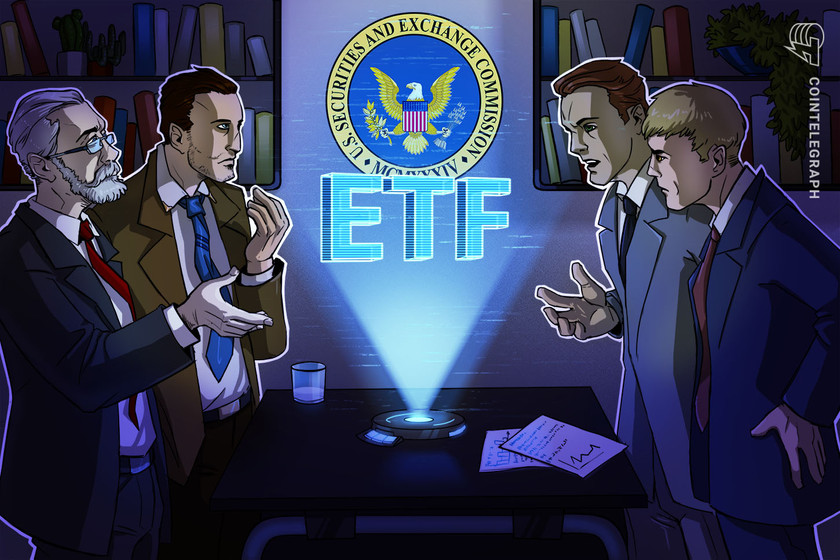
Axie Infinity's Ronin Bridge hackers have started moving their funds despite early hopes of a dialogue between the creators and the hackers.
The decentralized finance (DeFi) world saw another week of increased on-chain and developer activity even when the overall market cap took a slight dip amid overall market retrace. The creators of the popular play-to-earn nonfungible token (NFT) game Axie Infinity raised $150 million to reimburse hack victims of the Ronin bridge exploit.
The decantralized application, o daily user count surged to 2.4 million in the first quarter of 2022, while SushiSwap (SUSHI) and Synthetix (SNX) were booted out of Grayscale’s popular Decentralized Finance Fund. The widely-popular DeFi protocol Yearn.finance announced its support for the newly-passed ERC-4626 tokenized vault standard.
The price momentum of the majority of DeFi tokens remained in red over the past week, as the overall crypto market registered a retrace from new highs last week.
Axie Infinity creator raises $150M led by Binance to reimburse stolen funds
Sky Mavis, the creator of the popular play-to-earn nonfungible token game Axie Infinity has raised $150 million in a new funding round led by Binance.
The fundraiser is aimed at reimbursing lost funds from the recent exploit on Axie Infinity’s Ronin Bridge, which resulted in the loss of over $600 million. The funding round also saw participation from Animoca Brands, Andreessen Horowitz, Dialectic, Paradigm and Accel.
Apart from the $150 million raised funds, the remaining amount would be reimbursed from Sky Mavis and Axie Infinity’s balance sheet.
DApp daily users surge to 2.4M in Q1 2022 despite headwinds
According to a new industry report published by DappRadar, the number of users engaging in decentralized applications, or DApps, every day surged 396% year-over-year to 2.4 million. This is only 5.8% below the same user activity level witnessed in Q4 2021.
The overall growth was impressive, considering that the cryptocurrency sector saw a short-lived bear market during the quarter and experienced $1.19 billion in DeFi hacks and exploits.
Sushi and Synthetix get the boot in Grayscale DeFi Fund rebalancing
Digital asset management firm Grayscale has added three new cryptocurrency assets across three main investment funds while removing two other assets from its Decentralized Finance Fund as part of this year’s first quarterly rebalance.
Grayscale removed tokens from crypto-derivatives decentralized exchange Synthetix and decentralized exchange SushiSwap, as well as from its decentralized finance (DeFi) fund after the two crypto assets failed to meet the required minimum market capitalization. No other cryptocurrencies were removed during the rebalancing.
Yearn.finance advocates for the adoption of ERC-4626 tokenized vault standard
Following the successful deployment of 25 previous Ethereum Request for Comments (ERC) standards — including the industry-recognized ERC-20 for fungible tokens, ERC-721 for nonfungible tokens and the single smart contract multitoken ERC-1155 — the newly passed ERC-4626 is gaining traction within the Ethereum community due to its purported yield-bearing benefits.
Referred to as the “tokenized vault standard,” ERC-4626 is set to be implemented at the next Ethereum fork upgrade following approval by the developers within Ethereum’s governance procedure.
DeFi market overview
Analytical data reveals that DeFi’s total value locked has registered a $10 billion dip over the last week, reaching $130 billion at the time of writing. Data from Cointelegraph Markets Pro and TradingView reveals that DeFi’s top 100 tokens by market capitalization bled in red over the past week, along with the rest of the crypto market.

The weekly performance of the majority of the tokens remained on the bearish side, barring a few tokens that showed resistance against the trend. In the top-100 DeFi list, only Convex Finance (CVX) and Secret (SCRT) tokens traded in green, with CVX registering a 16% surge while SCRT rose by 4% over the past week.
Before you go!
The Ronin bridge hacker has started to move funds to coin mixers in a bid to launder the stolen Ether (ETH) and USD Coin (USDC). As per the latest report, the hacker account has sent out nearly $7 million to coin mixer services while moving another 2,018 ETH to a different wallet. While the creators of Axie Infinity have already raised $150 million and plan to utilize an additional $400 million from their balance sheet to reimburse users, the chances of getting back the stolen funds look thin at the moment.
Thanks for reading our summary of this week’s most impactful DeFi developments. Join us again next Friday for more stories, insights and education in this dynamically advancing space.















